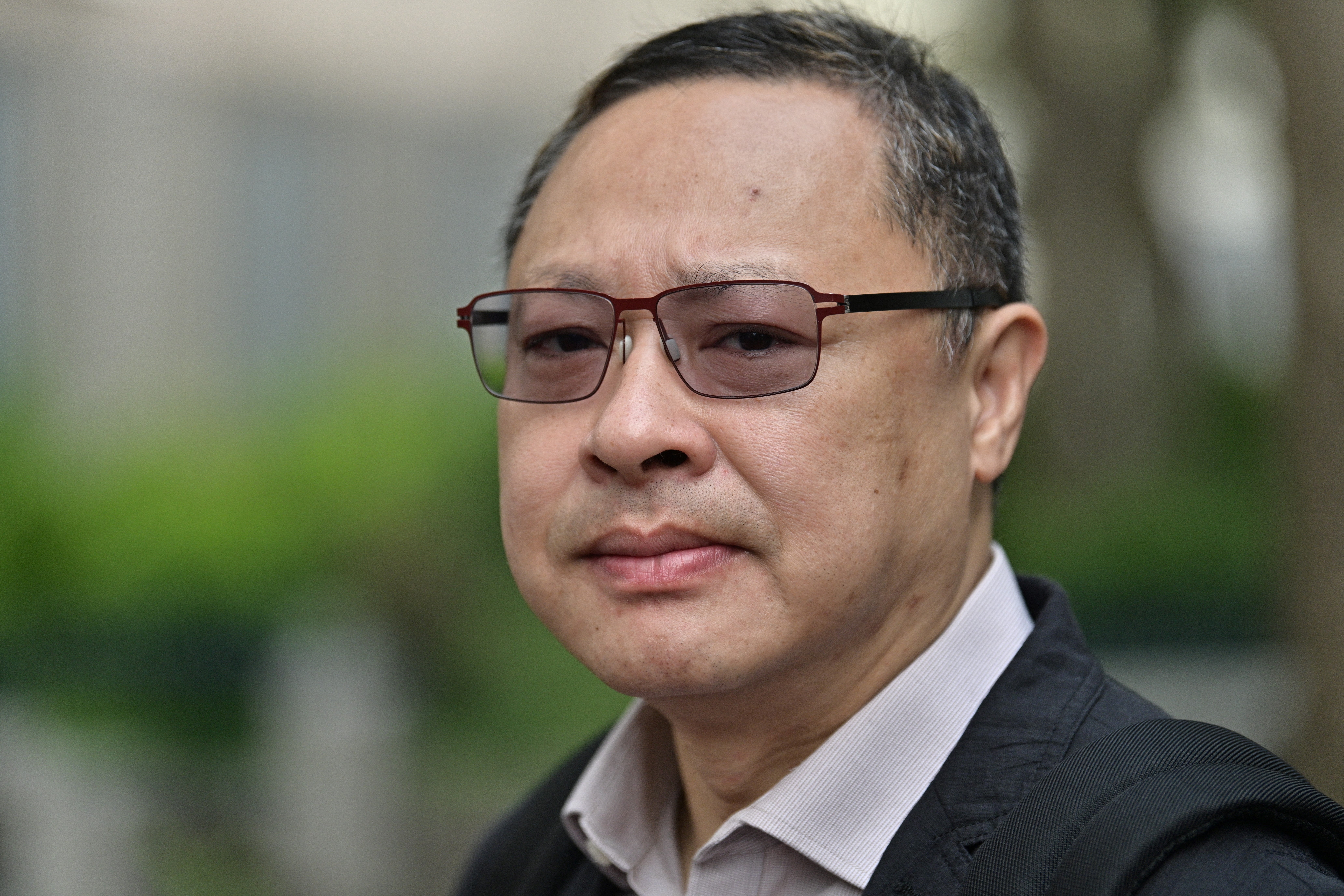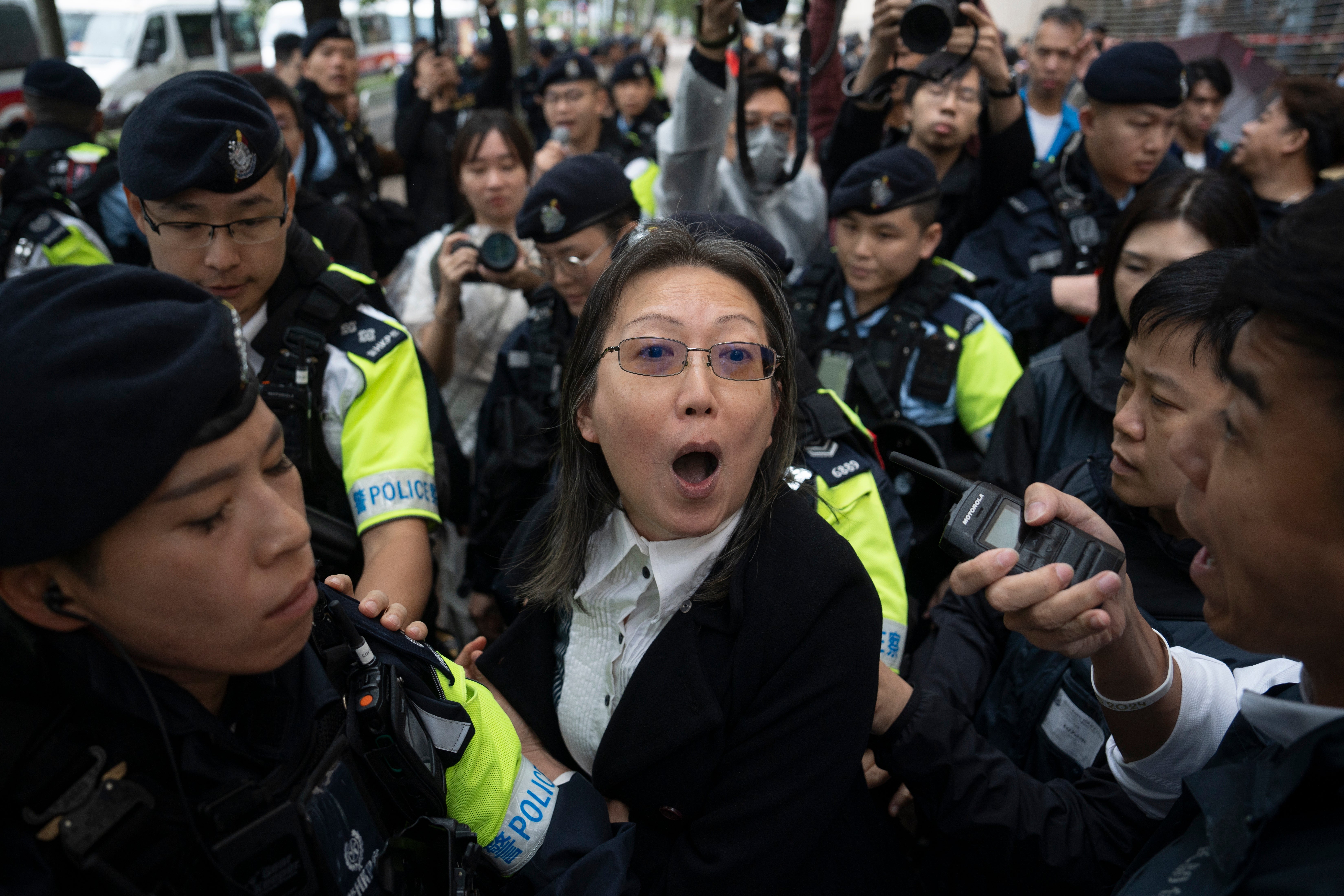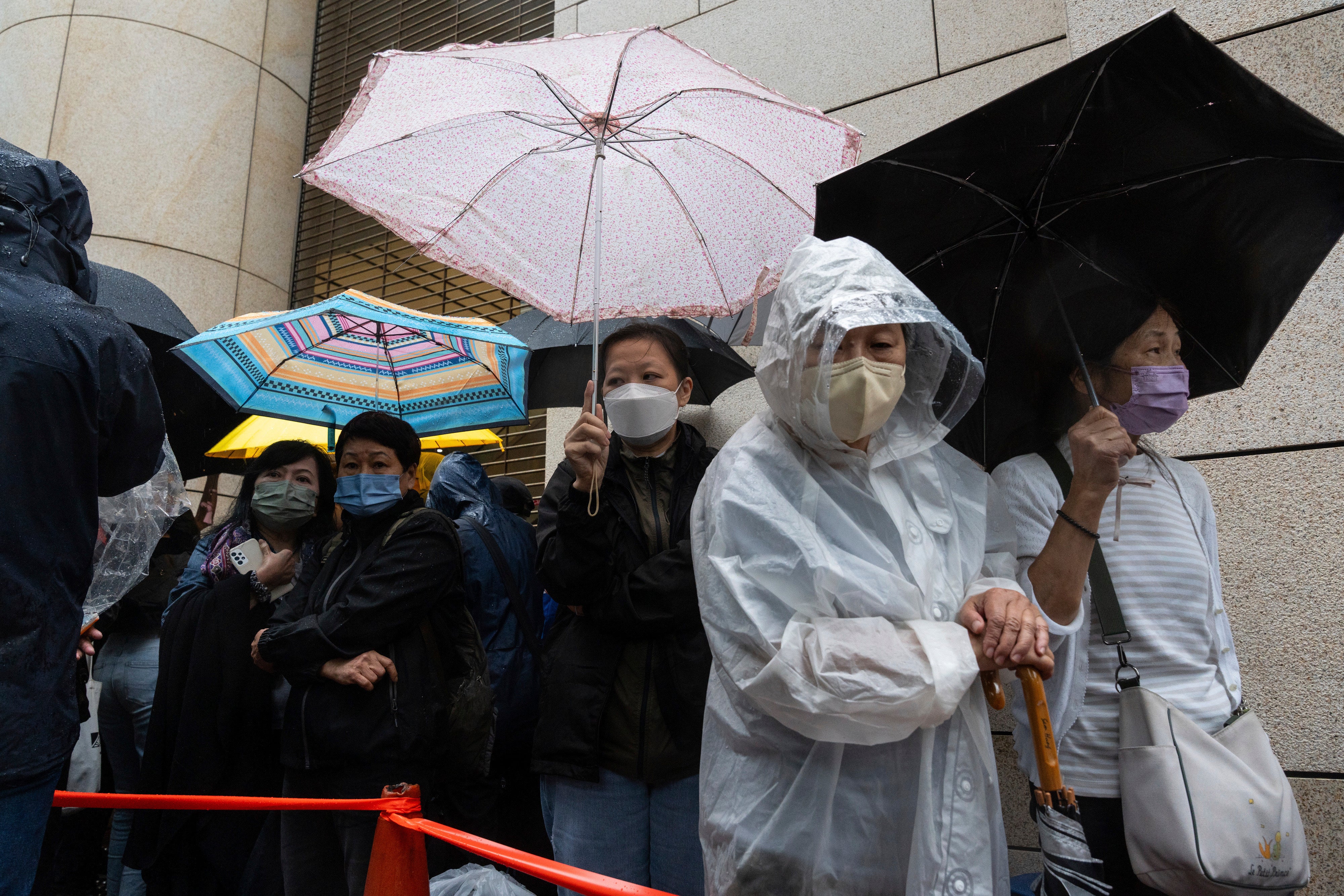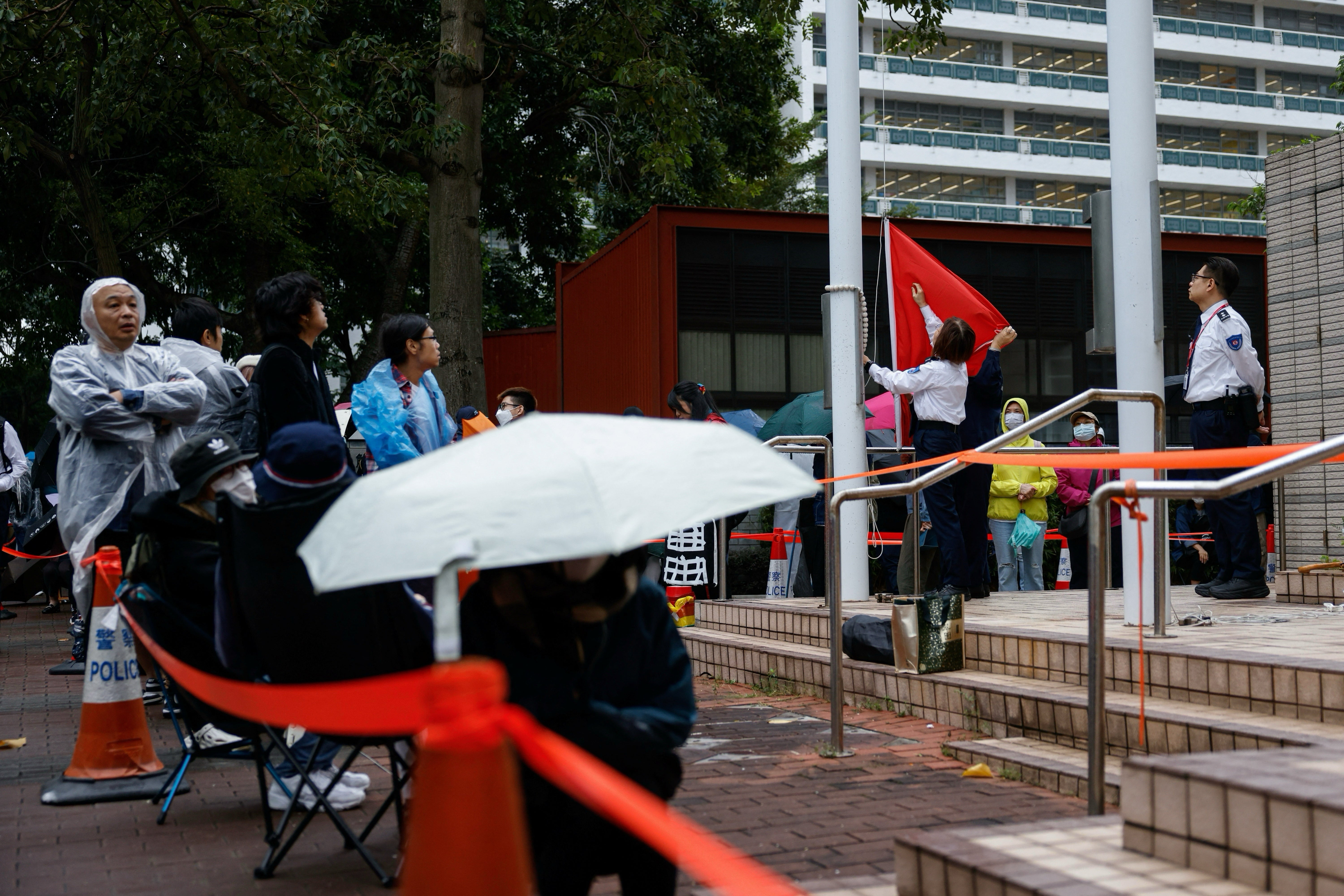Your support helps us to tell the story
From reproductive rights to climate change to Big Tech, The Independent is on the ground when the story is developing. Whether it’s investigating the financials of Elon Musk’s pro-Trump PAC or producing our latest documentary, ‘The A Word’, which shines a light on the American women fighting for reproductive rights, we know how important it is to parse out the facts from the messaging.
At such a critical moment in US history, we need reporters on the ground. Your donation allows us to keep sending journalists to speak to both sides of the story.
The Independent is trusted by Americans across the entire political spectrum. And unlike many other quality news outlets, we choose not to lock Americans out of our reporting and analysis with paywalls. We believe quality journalism should be available to everyone, paid for by those who can afford it.
Your support makes all the difference.
Scores of Hong Kong’s leading pro-democracy activists, collectively known as the “Hong Kong 47,” have been handed prison terms in the city’s largest trial under the national security law.
Prosecutors accused them of trying to overthrow the government, charging them under the new law brought by China three years ago. The High Court on Tuesday jailed 45 of them, while two had been acquitted earlier this year.
Critics have condemned the prosecution as politically motivated, targeting those who represented political resistance to Beijing’s increasing control over the former British colony which was returned to China in 1997.
The case centred on the group’s involvement in holding unofficial primaries in 2020 to secure a pro-democracy majority in the city legislature.
The organisers defended their actions saying that they were allowed under the Basic Law, the mini constitution that governs Hong Kong and guarantees its people a measure of freedom.
Prosecutors, however, charged that their plan to block government bills and force the resignation of the chief executive amounted to a conspiracy to commit subversion, a charge introduced under the sweeping security law.
Most of the defendants pleaded guilty.
The key figures in “Hong Kong 47” represent a cross-section of the city’s pro-democracy movement, from seasoned politicians to first-time activists inspired by the 2019 street protests.
They include Benny Tai, a legal scholar accused of orchestrating the primaries, activist Joshua Wong, and experienced opposition lawmakers Claudia Mo, Helena Wong, Kwok Ka-ki, and Leung Kwok-hung, popularly known as “Long Hair”.

Mo, a former journalist, is a well-known voice for democracy while Leung has been a fixture in the city’s political opposition.
A younger generation of activists such as Owen Chow, Ventus Lau, and Tiffany Yuen gained recognition for their vocal advocacy. Chow and Lau were involved in a defining moment of the 2019 protests when hundreds of people stormed the Legislative Council chamber, defacing the emblem of Hong Kong in what they claimed was an act of defiance against Beijing’s tightening grip, the BBC reported.
The group also includes individuals who were not active in politics before 2019 but motivated by the protests that year to act. Social worker Hendrick Lui, entrepreneur Mike Lam and former nurse Winnie Yu are among those who transitioned from their professional roles into activism.

Two members of “Hong Kong 47” were acquitted earlier this year. Laurence Lau, a barrister and former district councillor, and Lee Yue-shun, another former district councillor, were cleared of the charges in May.
Tai received the harshest sentence of 10 years as judges described him as the “mastermind” of a scheme to undermine the city government’s authority. The law professor rose to prominence in 2014 when he founded Occupy Central movement, which called for free and fair elections in Hong Kong. He was imprisoned in 2019 for his role in the Occupy Central protest.
Wong, 28, a prominent face of the 2019 protests was sentenced to over four years after pleading guilty. The court ruled that his previous convictions demonstrated he was “not of good character”.
He was the face of the 2014 Umbrella Movement, which had sprang up alongside the Occupy Central sit-in.
In 2019, Wong helped drum up overseas support for the protests. His activism resulted in Beijing calling him as an advocate of Hong Kong’s independence who had “begged for interference” from foreign forces.
Leung, 68, known for his political theatrics and hurling bananas as a sign of protest, was jailed for six years and nine months.

Gordon Ng, a dual citizen of Australia and Hong Kong, was sentenced to over seven years, one of the longest terms for those who pleaded not guilty and contested the charges. He was convicted in May this year.
Former Stand News journalist Gwyneth Ho, who planned to run as a candidate in the unofficial primaries, got seven years after pleading not guilty.
Mo, 67, a former legislator who did plead guilty, received one of the shortest sentences of four years and two months. The judges held that she was an “active participant” in the scheme but gave her a relatively lenient sentence after taking her public service into account.
The trial, which concluded this week, drew significant public attention. Long queues formed outside the West Kowloon Magistrates Court as supporters braved rain and police searches to witness the proceedings.
The trial has reignited concerns about Hong Kong’s diminishing freedoms. Critics argue the security law has been weaponised to suppress political opposition. Western governments and human rights organisations have repeatedly criticised the law, calling it a tool for eroding civil liberties.
Hong Kong‘s last British governor, Chris Patten, said in a statement that the sentencing was “not only an affront to the people of Hong Kong, but those who value rights and freedoms around the world”.
He condemned the “sham” sentences, calling on the British government not to allow the matter to go unnoticed.

The US Consulate in Hong Kong said America strongly condemned the sentences. “The defendants were aggressively prosecuted and jailed for peacefully participating in normal political activity protected under Hong Kong‘s Basic Law,” it said in a statement.
Australian foreign minister Penny Wong expressed “grave concern” over Ng’s sentence, calling out the broad application of the security law.
Authorities in Beijing and Hong Kong, however, maintain the law has been essential in restoring stability after the 2019 protests and warned against foreign “interference”.
Hong Kong secretary for security Chris Tang said in a news briefing that the sentences showed those committing national security crimes must be severely punished.
Additional reporting by agencies.

